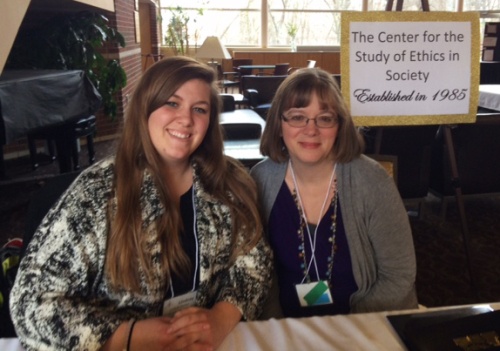Bioethics conference sparks collaboration and important conversations

This blog was originally published on May 20, 2016.
On March 17 and 18, 2016, Western Michigan University’s Center for the Study of Ethics in Society presented a conference called “Bioethics: Preparing for the Unknown.”
Cooley Law School professors and law students were well-represented among the speakers, presenting on topics such as informed consent, medical quarantines, youth health care, and drug addiction. The conference sparked important conversations surrounding the theme of uncertainty, a fundamental reality in bioethics. The study of bioethics brings to the forefront concepts of right and wrong, good and bad; blending and blurring the areas of philosophy, theology, history, law, and medicine.
Many topics were covered, including the unintended consequences of innovative medical technologies, public health planning for new diseases, incidental findings in clinical research and practice, prevention of medical error, and communication of risk.
The conference brought together presenters from around the nation and from many different universities, medical schools, and disciplines. Those universities included Emory, Michigan State, Grand Valley State, Central Michigan, University of Michigan Medical School, Indiana State, Loyola, Purdue, Stetson, Columbia, Utah Valley, Case Western, University of Iowa, University of Texas, University of Maryland, and the University of St. Louis. Other speaker hailed from The Mayo Clinic, several Canadian universities, and from Sweden. Speakers were faculty experts from medical schools, philosophy professors, and graduate students; experts in communications, bioethics, and genetics, as well as speakers in other disciplines.
“It was so interesting learning about ethical issues that exist with respect to new, cutting-edge medical treatments,” said Cooley Law School Professor Lauren Rousseau. “Medical research is taking us to a new era of disease treatment, but the cost and limitations of these new treatments force decisions that have ethical implications.” Professor Rousseau presented a paper entitled, “Paradigm Shift: How the Opioid Epidemic is Driving Change in Perception, Treatment, & the Law.”
Cooley Law School Professor Christopher Trudeau presented a paper entitled, “Ethical Communication in Human-Subjects Research: Creating an Informed Consent That Effectively Communicates Risk and Promotes Personal Autonomy.”
“This was a wonderfully inclusive bioethics conference with a diverse audience,” said Professor Trudeau. “After my session discussing the ethics of communicating with research participants, one of the heads of such trials from the Mayo Clinic helped engage the group in a deeper discussion of how these issues practically impact a world-class research institution.”
Professors Tracey Brame and Devin Schindler of the Cooley Law School’s Grand Rapids campus presented a paper entitled, “This Medication May Kill You: Cognitive Overload and Mandated Informed Consent.”
“The legal system has not yet caught up to the rapidly changing world of medical technology,” stated Professor Schindler. “This conference gave scholars and students from around the country the opportunity to discuss options for modernizing a legal system not yet well prepared for 21st century technology.”
“The interdisciplinary approach to the topic made for robust conversation among students and professors,” agreed Professor Brame. “The opportunity to collaborate with colleagues from WMU and other schools was invaluable.”
Professor Victoria Vuletich, a board member of the Center for the Study of Ethics in Society which sponsored the event, facilitated the discussion on informed consent. “It was invigorating and refreshing to explore the intersection of law and medicine. Representatives of some of finest national medical institutions particpiated in this discussion and their comments were educational and informative. It always good to have cross-discipline ‘pollination.'”
In addition to Cooley law professors, Cooley Law School students participated as speakers at the conference. Christopher Marker, a 3L at the Grand Rapids campus, presented a paper entitled, “Quarantining an A-symptomatic Carrier: A Reasonableness Standard.” Holliann Willekes, another 3L at the Grand Rapids campus, presented a paper entitled, “Minors and Health Care.” And both of these law students joined Cooley Law School Grand Rapids law student Daniel LoBello, and Kineta Sadler, a graduate student from Michigan State University, to participate in a panel discussion entitled, “Bioethics Training for Front Line Medical Providers and Staff: Legal and Ethical Issues.”
Conference attendees and speakers had an opportunity to interact socially at a dinner at the WMU Ethics Center the first night of the conference. WMU President John Dunn was in attendance, as well as a number of WMU professors. The entire event provided a wonderful opportunity for the Cooley Law School faculty and student speakers to interact with faculty and staff from WMU, and to explore ways in which law and bioethics intersect.

